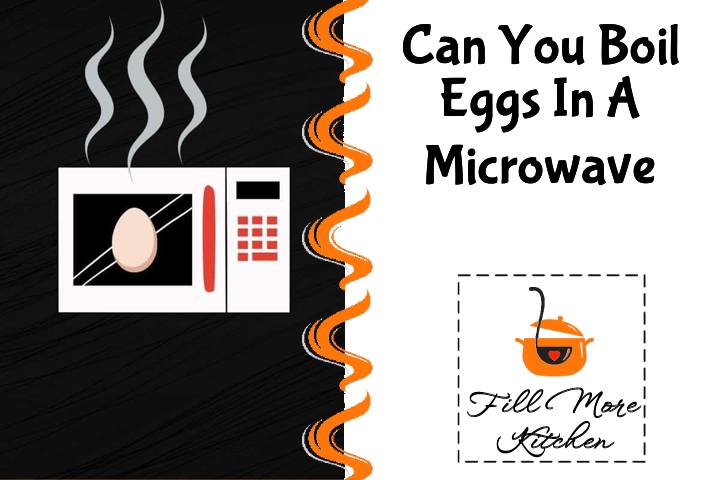Eggs, whether boiled or pan-fried, are a common breakfast item in most households. They are simple to prepare, require minimal kitchen expertise, and can be cooked and served within minutes. Typically, eggs are boiled using an egg cooker or a pot on the stove.
If you have ever used your microwave to heat water for tea or coffee, it is likely that you have considered boiling eggs in the microwave and wondered if it is possible.
You can boil eggs in a microwave by placing a deep microwave-safe bowl with warm water or an EggPod in the microwave. Place the eggs in the bowl, add salt, and run the microwave at 800-900 watts for 5-8 minutes depending on how you want them cooked. Poke a minuscule hole in the shell to prevent the egg from exploding.
If you want to boil eggs in a microwave, it can be an easy process that requires some modifications to avoid the hassle of cleaning up after an egg explosion. To learn the most effective way to boil eggs in a microwave, keep reading.
How to Boil Eggs in a Microwave Oven
When microwaving eggs, it is crucial to prevent them from exploding during the cooking process. To achieve this, use a microwave-safe bowl and follow these straightforward steps to boil your eggs safely.
To boil eggs in a microwave, start by filling a microwave-safe bowl with water and placing the eggs inside. It is important to make sure that the eggs are fully covered by the water.
For every egg in the bowl, include half a teaspoon of table salt to prevent them from exploding while boiling in the microwave.
Step 3: Allow the eggs to cook in the microwave for a duration of 5-8 minutes, depending on your preference for soft, medium, or hard-boiled eggs.
Another option is to use this method to avoid the eggs from bursting while being cooked.
To boil eggs in a microwave, start by filling a bowl that is safe for microwaving with water and heating it for three minutes.
Step 2: It is crucial to use a safety pin or a thin sharp object to puncture the bottom of an egg before boiling it in a microwave, as this prevents the eggs from exploding.
Thirdly, put the punctured eggs into a bowl filled with hot water and cover it. Proceed to microwave the eggs using a lower heating power of 50 percent.
Step 4: Allow the eggs to boil for a duration of 4-10 minutes, depending on your preference for the level of firmness.
When it comes to hard-boiled eggs, peeling them should not be difficult, but soft-boiled eggs, which are only partially cooked and still have their shells on, may present a slight challenge.
If cracking the eggshell with your hands is difficult, try using a spoon to gently tap on each side of the egg until it cracks. Then, use the spoon to carefully remove the shell, which should be an easy process.
If you want to save time peeling a large number of eggs, it is recommended to wait until the next day after boiling them as the shell comes off more easily then.
How Do You Hard, Medium, and Soft Boil an Egg in the Microwave?
For many individuals, microwaving eggs can be a process of experimentation since each microwave operates differently, necessitating modifications to achieve desirable outcomes.
For microwave egg boiling, it is recommended to begin with one egg to determine the desired settings before adding additional eggs. If any of the eggs do not meet expectations, they can be remedied by frying them or attempting to re-boil them.
Hard-Boiled Eggs In the Microwave
If you want to make hard-boiled eggs in a microwave, you can do so by boiling them for 5-8 minutes, adjusting the time according to your microwave’s power. Once boiled, keep the eggs in hot water for three minutes before transferring them to an ice bath for cooling.
Medium-Boiled Eggs In the Microwave
The hardness of boiled eggs is determined by the duration they remain in hot water. For medium-boiled eggs, it is recommended to transfer them to an ice bath after one minute of boiling.
If you want to prepare medium-boiled eggs using a microwave, simply place two eggs in the microwave oven and cook them for 4 minutes.
If you are boiling more than one egg, it is recommended to increase the cooking time by 30 seconds for each additional egg to ensure proper boiling.
Soft-Boiled Eggs In the Microwave
If you prefer your eggs to be soft-boiled, microwave them for three minutes and then promptly place them in an ice bath.
Time adjustments may be necessary based on the wattage of your microwave when boiling eggs. For larger eggs, it is recommended to set the timer for approximately 4 minutes and make further adjustments as needed. When boiling more than three eggs, time should also be adjusted accordingly.
I Recommend Microwaving Your Eggs In an Egg Pod
Are you familiar with egg pods? They are small steamers that can accommodate 4 eggs and cook them in the microwave. Once cooked, shaking the egg pod with the eggs inside will make them easy to peel. By using an egg pod, your eggs can be ready to eat in less than 9 minutes.
Using egg pods makes boiling eggs in the microwave a breeze, particularly for hard-boiled eggs, and they can also be utilized for cooking vegetables.
How Do You Use an Egg Pod In the Microwave?
Using an egg pod is effortless as all the necessary components are included in the product, except for the microwave, which I assume you already possess or intend to purchase since you are perusing this article.
Once you have all the necessary elements, just adhere to these guidelines.
Step 1: Fill the bottom tray of the egg pod with approximately 50 milliliters of water, adjusting the amount according to the size of your egg pod; for this demonstration, we are using an egg pod that can hold four eggs.
To boil eggs in a microwave, you need to seal the top of the bottom tray and heat it at high temperatures for 9 minutes.
Step 3: Once the timer goes off after 9 minutes, refrain from opening the microwave and instead set an additional alarm for two minutes and patiently wait.
After two minutes, move the egg pod to a sink with cold running water and let it run over the eggs for another two minutes; alternatively, you can use a jar to pour cold water over the eggs if there is no access to running water.
Step 5: After keeping the water in the bottom pod as it is, seal its top with the other half and give the pod a good shake for about 10 to 15 times, which will cause the eggshells to crack.
Step 6: Uncover the lid of the egg pod to find fully cooked eggs that are now easy to peel. In some cases, it may be necessary to rinse the eggs with water and remove any remaining shell fragments.
Is It Safe To Boil Eggs In A Microwave?
It is safe to boil eggs in a microwave if you follow the recommended safety measures to avoid explosions or water leakage from the bowl into the microwave oven.
Aside from that, cooking eggs in a microwave is generally safe.
When boiling eggs or cooking other foods in a microwave, it is advisable to use a microwave-safe bowl made of ceramics or glass that does not contain plastics. Additionally, it is important to refrain from using metal or aluminum foil in the microwave.
To avoid eggs from exploding while boiling in the microwave, you can take precautions such as adding salt to the bowl or piercing the eggs with a sharp object before microwaving them.
When boiling eggs in a microwave, it is important to handle the eggs with care in the bowl to prevent water from splashing or damaging them, and ensure that the bowl has enough depth to contain the water without overflowing.
Finally, ensure that you do not overcook your eggs in the microwave and keep a close eye on them during the initial attempts.
Can Raw Eggs Explode In The Microwave?
Boiling a raw egg in a microwave can lead to an explosion if proper precautions are not taken, but piercing or poking the egg before microwaving it will release the trapped air and decrease the pressure inside the shell.
When an egg is boiled in water, it undergoes a transformation from plasma to solid state and becomes rubbery due to the superheated water content. If the boiled egg is cracked, the superheated water boils instantly in the air causing an explosion.
According to a recent study, microwaving an egg can cause it to become a superheated sauna or pressure cooker due to the yolk having a higher temperature than boiling water, which may be the reason for explosions.
According to the research, the eggs that burst in the microwave generated a noise exceeding 100 decibels, which is comparable to standing near a motorcycle in operation. Although the sound is brief and does not cause any bodily harm, one can envision the chaos it would create within the microwave.
Nevertheless, there is no need to be concerned about detonations if you follow the straightforward procedure provided. It is important to either puncture the eggs or include salt in the boiling container.
You can also check this video about “Can You Boil Eggs In A Microwave?”
Check out our top 10 reviews!
Related posts
https://fillmorekitchen.com/can-you-put-a-mug-in-the-microwave/
https://fillmorekitchen.com/how-long-can-you-leave-dishes-in-the-dishwasher/
https://fillmorekitchen.com/why-wont-my-toaster-oven-turn-on-fix/
https://fillmorekitchen.com/can-you-clean-oven-racks-in-the-dishwasher/
https://fillmorekitchen.com/what-you-should-and-shouldnt-clean-your-microwave-oven-with/



